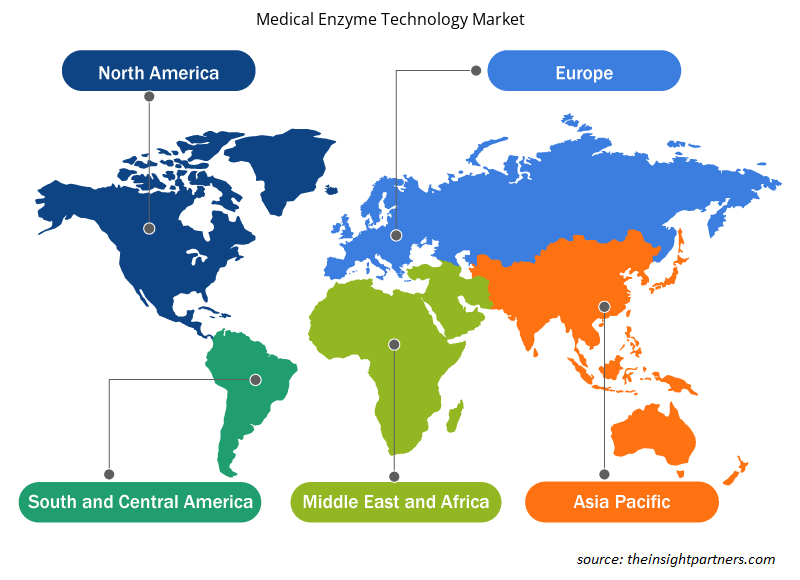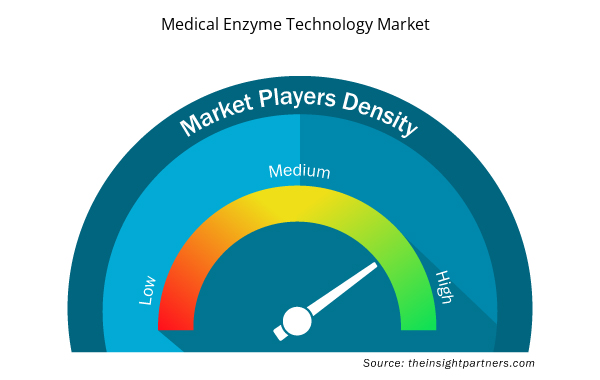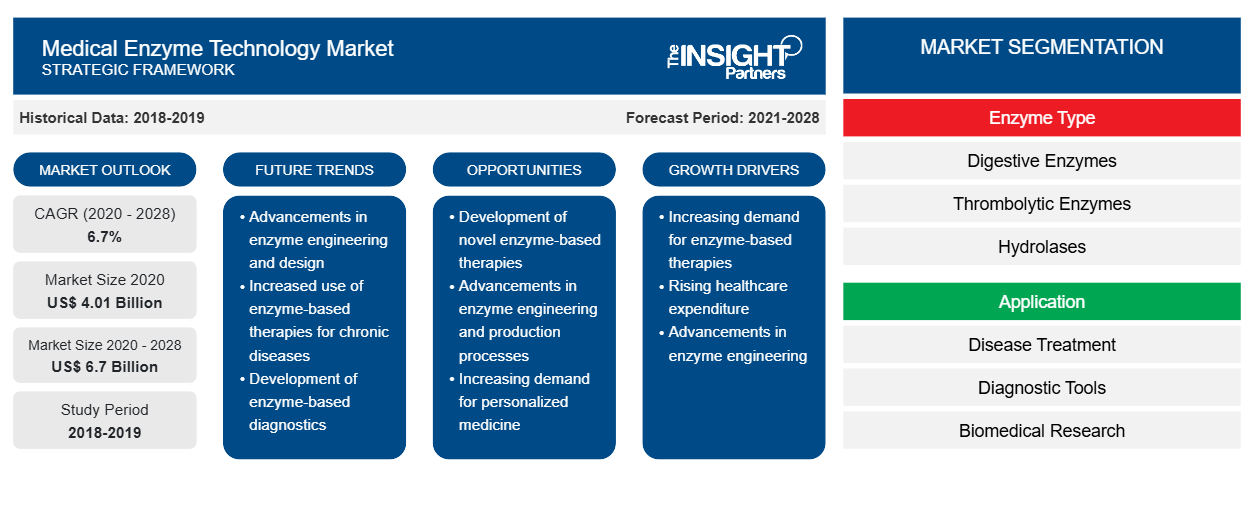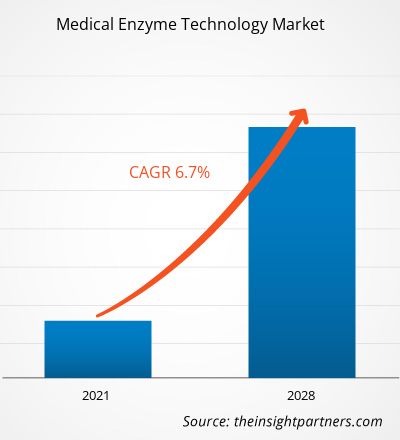Die medizinische Enzymtechnologie dürfte von 4.012,57 Millionen US-Dollar im Jahr 2020 auf 6.700,00 Millionen US-Dollar im Jahr 2028 anwachsen; von 2021 bis 2028 wird mit einer durchschnittlichen jährlichen Wachstumsrate von 6,7 % gerechnet.
Der Markt für medizinische Enzymtechnologie wurde anhand von Enzymtyp, Anwendung und Region analysiert. Der Markt ist nach Regionen segmentiert in Nordamerika, Europa, Asien-Pazifik, den Nahen Osten und Afrika sowie Süd- und Mittelamerika. Der Bericht legt den Schwerpunkt auf Parameter wie Markttrends, technologische Fortschritte, Marktdynamik und die Analyse der Wettbewerbslandschaft führender Unternehmen, um Einblicke und eingehende Analysen des Marktes für medizinische Enzymtechnologie zu bieten . Er umfasst auch die Analyse der COVID-19-Pandemie auf dem gesamten Markt in allen Schlüsselregionen.
Markteinblicke
Fortschritte in der Enzymtechnik werden zum wichtigsten Trend auf dem Markt für medizinische Enzymtechnologie
Enzym-Engineering spielt eine grundlegende Rolle bei der Entwicklung effizienter Biokatalysatoren für Biotechnologie, Biowissenschaften und Biomedizin . Enzym-Engineering ist der Prozess der maßgeschneiderten Entwicklung neuer Biokatalysatoren mit verbesserten Eigenschaften durch Veränderung ihrer Aminosäuresequenzen. Trotz der Vielzahl möglicher Veränderungen hat dieses Verfahren bereits bemerkenswerte Ergebnisse in Form einzigartiger Designs und Optimierungen von Enzymen für die chemische und pharmazeutische Biosynthese, regenerative Medizin, Lebensmittelproduktion, Abfallabbau und Biosensorik erbracht .
Passen Sie diesen Bericht Ihren Anforderungen an
Sie erhalten kostenlose Anpassungen an jedem Bericht, einschließlich Teilen dieses Berichts oder einer Analyse auf Länderebene, eines Excel-Datenpakets sowie tolle Angebote und Rabatte für Start-ups und Universitäten.
- Holen Sie sich die wichtigsten Markttrends aus diesem Bericht.Dieses KOSTENLOSE Beispiel umfasst eine Datenanalyse von Markttrends bis hin zu Schätzungen und Prognosen.
Neben klassischen Ansätzen des rationalen Designs und der gerichteten Evolution werden zunehmend Methoden des maschinellen Lernens (ML) eingesetzt, um Muster in Daten zu finden, die dabei helfen, Proteinstrukturen vorherzusagen, die Stabilität, Löslichkeit und Funktion von Enzymen zu verbessern, die Substratspezifität vorherzusagen und ein rationales Proteindesign zu steuern. Maschinelles Lernen ist ein dritter Ansatz zur Entwicklung neuer Biokatalysatoren , der seit einigen Jahrzehnten an Aufmerksamkeit gewinnt. Anders als die modellbasierten Methoden des rationalen Designs ist diese Strategie datengesteuert, da sie Muster in den vorhandenen Daten identifiziert, um Eigenschaften unbekannter, aber ähnlicher Eingaben vorherzusagen. Im Januar 2020 startete Curative Enzymes, ein Produkt- und Dienstleistungsanbieter, einen Service für Enzym-Engineering und -Modifizierung, um Großkunden zu unterstützen.
Mit dem Aufkommen neuer Techniken und Methoden zur Rekonstruktion und Entwicklung von Enzymen ist die Arbeit im Bereich Protein-Engineering bequemer geworden und bringt neue halbsynthetische oder synthetische Biokatalysatoren und Moleküle für industrielle Anwendungen ans Licht. Daher dürften Fortschritte im Enzym-Engineering im Prognosezeitraum ein vorherrschender Trend auf dem Markt sein.
Enzymtypbasierte Erkenntnisse
Der Markt für medizinische Enzymtechnologie ist nach Enzymtyp in Verdauungsenzyme, thrombolytische Enzyme, Hydrolasen und Endonukleasen unterteilt . Das Segment Hydrolasen hatte im Jahr 2020 den größten Marktanteil; außerdem wird erwartet, dass das Segment thrombolytische Enzyme im Prognosezeitraum die höchste durchschnittliche jährliche Wachstumsrate (CAGR) von 7,2 % auf dem Markt verzeichnet.
Anwendungsbasierte Erkenntnisse
Der Markt für medizinische Enzymtechnologie ist nach Anwendung in Krankheitsbehandlung, Diagnoseinstrumente, biomedizinische Forschung und andere unterteilt. Das Segment Krankheitsbehandlung hatte im Jahr 2020 den größten Marktanteil, und es wird erwartet, dass dasselbe Segment im Prognosezeitraum die höchste durchschnittliche jährliche Wachstumsrate (CAGR) von 7,1 % auf dem Markt verzeichnet.
Unternehmen, die auf dem Markt für medizinische Enzymtechnologie tätig sind, verfolgen organische Strategien wie Produkteinführungen und -erweiterungen, um ihre Präsenz und ihr Produktportfolio weltweit zu vergrößern und der wachsenden Nachfrage gerecht zu werden.
Regionale Einblicke in den Markt für medizinische Enzymtechnologie
Die regionalen Trends und Faktoren, die den Markt für medizinische Enzymtechnologie im Prognosezeitraum beeinflussen, wurden von den Analysten von Insight Partners ausführlich erläutert. In diesem Abschnitt werden auch die Marktsegmente und die Geografie der medizinischen Enzymtechnologie in Nordamerika, Europa, im asiatisch-pazifischen Raum, im Nahen Osten und Afrika sowie in Süd- und Mittelamerika erörtert.

- Erhalten Sie regionale Daten zum Markt für medizinische Enzymtechnologie
Umfang des Marktberichts zur medizinischen Enzymtechnologie
| Berichtsattribut | Details |
|---|---|
| Marktgröße im Jahr 2020 | 4,01 Milliarden US-Dollar |
| Marktgröße bis 2028 | 6,7 Milliarden US-Dollar |
| Globale CAGR (2020 - 2028) | 6,7 % |
| Historische Daten | 2018-2019 |
| Prognosezeitraum | 2021-2028 |
| Abgedeckte Segmente | Nach Enzymtyp
|
| Abgedeckte Regionen und Länder | Nordamerika
|
| Marktführer und wichtige Unternehmensprofile |
|
Dichte der Marktteilnehmer im Bereich der medizinischen Enzymtechnologie: Deren Auswirkungen auf die Geschäftsdynamik verstehen
Der Markt für medizinische Enzymtechnologie wächst rasant, angetrieben durch die steigende Nachfrage der Endnutzer aufgrund von Faktoren wie sich entwickelnden Verbraucherpräferenzen, technologischen Fortschritten und einem größeren Bewusstsein für die Vorteile des Produkts. Mit steigender Nachfrage erweitern Unternehmen ihr Angebot, entwickeln Innovationen, um die Bedürfnisse der Verbraucher zu erfüllen, und nutzen neue Trends, was das Marktwachstum weiter ankurbelt.
Die Marktteilnehmerdichte bezieht sich auf die Verteilung der Firmen oder Unternehmen, die in einem bestimmten Markt oder einer bestimmten Branche tätig sind. Sie gibt an, wie viele Wettbewerber (Marktteilnehmer) in einem bestimmten Marktraum im Verhältnis zu seiner Größe oder seinem gesamten Marktwert präsent sind.
Die wichtigsten auf dem Markt für medizinische Enzymtechnologie tätigen Unternehmen sind:
- Merck
- Thermo Fisher Scientific Inc.
- Novozyme
- TAKEDA PHARMACEUTICAL COMPANY LIMITED
- Agilent Technologies, Inc.
Haftungsausschluss : Die oben aufgeführten Unternehmen sind nicht in einer bestimmten Reihenfolge aufgeführt.

- Überblick über die wichtigsten Akteure auf dem Markt für medizinische Enzymtechnologie
Nach Enzymtyp
- Verdauungsenzym
- L-Asparaginase
- Laktase
- Sonstiges
- Thrombolytisches Enzym
- Streptokinase
- Urokinase
- Sonstiges
- Hydrolasen-Enzym
- Hyaluronidase
- Lysozyme
- Sonstiges
- Endonukleasen-Enzym
- Benzonase
- Sonstiges
Nach Anwendung
- Krankheitsbehandlungen
- Diagnosetools
- Biomedizinische Forschung
- Sonstiges
Von
Geographie
Nordamerika
- UNS
- Kanada
- Mexiko
Europa
- Frankreich
- Deutschland
- Italien
- Vereinigtes Königreich
- Spanien
- Restliches Europa
Asien-Pazifik (APAC)
- China
- Indien
- Südkorea
- Japan
- Australien
- Restlicher Asien-Pazifik-Raum
Naher Osten und Afrika (MEA)
- Südafrika
- Saudi-Arabien
- Vereinigte Arabische Emirate
- Rest von MEA
Süd- und Mittelamerika (SCAM)
- Brasilien
- Argentinien
- Rest von SCAM
Firmenprofile
- Merck
- Thermo Fisher Scientific Inc.
- Novozyme
- TAKEDA PHARMACEUTICAL COMPANY LIMITED
- Agilent Technologies, Inc.
- Danaher (Cytiva)
- Sanofi
- Asahi Kasei Corporation
- Promega Corporation
- Amano Enzyme Inc
- Genzyme Corporation
- Historische Analyse (2 Jahre), Basisjahr, Prognose (7 Jahre) mit CAGR
- PEST- und SWOT-Analyse
- Marktgröße Wert/Volumen – Global, Regional, Land
- Branche und Wettbewerbsumfeld
- Excel-Datensatz



Report Coverage
Revenue forecast, Company Analysis, Industry landscape, Growth factors, and Trends

Segment Covered
This text is related
to segments covered.

Regional Scope
North America, Europe, Asia Pacific, Middle East & Africa, South & Central America

Country Scope
This text is related
to country scope.
Häufig gestellte Fragen
The costs of the Medical Enzyme Technology are much higher, and they may cost US$ 5–50, or more, per enzyme type. The cost may also differ from product to product types.
Key factors that are driving the market are advent of recombinant DNA technology, it has become possible to make formerly rare enzymes in large quantities and hence to reduce cost. Also, in pharmaceutical manufacturing, the desire to make chirally pure compounds is leading to new opportunities. Technological advances have facilitated the use of enzymes over an increasingly broad range of process conditions.
Enzymes are proteins produced in living cells of plants, animals, and microorganisms. All living organisms require enzymes for growth and for the production and utilization of energy which is essential for life. In the living cell, enzymes act as catalysts to speed up the chemical reactions which control life processes. Enzymes have been significant industrial products for more than a hundred years. However, the range of potential applications is increasing rapidly.
Trends and growth analysis reports related to Life Sciences : READ MORE..
The List of Companies - Medical Enzyme Technology Market
- Merck
- Thermo Fisher Scientific Inc.
- Novozymes
- TAKEDA PHARMACEUTICAL COMPANY LIMITED
- Agilent Technologies, Inc.
- Danaher (Cytiva)
- Sanofi
- Asahi Kasei Corporation
- Promega Corporation
- Amano Enzyme Inc
- Genzyme Corporation
The Insight Partners performs research in 4 major stages: Data Collection & Secondary Research, Primary Research, Data Analysis and Data Triangulation & Final Review.
- Data Collection and Secondary Research:
As a market research and consulting firm operating from a decade, we have published and advised several client across the globe. First step for any study will start with an assessment of currently available data and insights from existing reports. Further, historical and current market information is collected from Investor Presentations, Annual Reports, SEC Filings, etc., and other information related to company’s performance and market positioning are gathered from Paid Databases (Factiva, Hoovers, and Reuters) and various other publications available in public domain.
Several associations trade associates, technical forums, institutes, societies and organization are accessed to gain technical as well as market related insights through their publications such as research papers, blogs and press releases related to the studies are referred to get cues about the market. Further, white papers, journals, magazines, and other news articles published in last 3 years are scrutinized and analyzed to understand the current market trends.
- Primary Research:
The primarily interview analysis comprise of data obtained from industry participants interview and answers to survey questions gathered by in-house primary team.
For primary research, interviews are conducted with industry experts/CEOs/Marketing Managers/VPs/Subject Matter Experts from both demand and supply side to get a 360-degree view of the market. The primary team conducts several interviews based on the complexity of the markets to understand the various market trends and dynamics which makes research more credible and precise.
A typical research interview fulfils the following functions:
- Provides first-hand information on the market size, market trends, growth trends, competitive landscape, and outlook
- Validates and strengthens in-house secondary research findings
- Develops the analysis team’s expertise and market understanding
Primary research involves email interactions and telephone interviews for each market, category, segment, and sub-segment across geographies. The participants who typically take part in such a process include, but are not limited to:
- Industry participants: VPs, business development managers, market intelligence managers and national sales managers
- Outside experts: Valuation experts, research analysts and key opinion leaders specializing in the electronics and semiconductor industry.
Below is the breakup of our primary respondents by company, designation, and region:

Once we receive the confirmation from primary research sources or primary respondents, we finalize the base year market estimation and forecast the data as per the macroeconomic and microeconomic factors assessed during data collection.
- Data Analysis:
Once data is validated through both secondary as well as primary respondents, we finalize the market estimations by hypothesis formulation and factor analysis at regional and country level.
- Macro-Economic Factor Analysis:
We analyse macroeconomic indicators such the gross domestic product (GDP), increase in the demand for goods and services across industries, technological advancement, regional economic growth, governmental policies, the influence of COVID-19, PEST analysis, and other aspects. This analysis aids in setting benchmarks for various nations/regions and approximating market splits. Additionally, the general trend of the aforementioned components aid in determining the market's development possibilities.
- Country Level Data:
Various factors that are especially aligned to the country are taken into account to determine the market size for a certain area and country, including the presence of vendors, such as headquarters and offices, the country's GDP, demand patterns, and industry growth. To comprehend the market dynamics for the nation, a number of growth variables, inhibitors, application areas, and current market trends are researched. The aforementioned elements aid in determining the country's overall market's growth potential.
- Company Profile:
The “Table of Contents” is formulated by listing and analyzing more than 25 - 30 companies operating in the market ecosystem across geographies. However, we profile only 10 companies as a standard practice in our syndicate reports. These 10 companies comprise leading, emerging, and regional players. Nonetheless, our analysis is not restricted to the 10 listed companies, we also analyze other companies present in the market to develop a holistic view and understand the prevailing trends. The “Company Profiles” section in the report covers key facts, business description, products & services, financial information, SWOT analysis, and key developments. The financial information presented is extracted from the annual reports and official documents of the publicly listed companies. Upon collecting the information for the sections of respective companies, we verify them via various primary sources and then compile the data in respective company profiles. The company level information helps us in deriving the base number as well as in forecasting the market size.
- Developing Base Number:
Aggregation of sales statistics (2020-2022) and macro-economic factor, and other secondary and primary research insights are utilized to arrive at base number and related market shares for 2022. The data gaps are identified in this step and relevant market data is analyzed, collected from paid primary interviews or databases. On finalizing the base year market size, forecasts are developed on the basis of macro-economic, industry and market growth factors and company level analysis.
- Data Triangulation and Final Review:
The market findings and base year market size calculations are validated from supply as well as demand side. Demand side validations are based on macro-economic factor analysis and benchmarks for respective regions and countries. In case of supply side validations, revenues of major companies are estimated (in case not available) based on industry benchmark, approximate number of employees, product portfolio, and primary interviews revenues are gathered. Further revenue from target product/service segment is assessed to avoid overshooting of market statistics. In case of heavy deviations between supply and demand side values, all thes steps are repeated to achieve synchronization.
We follow an iterative model, wherein we share our research findings with Subject Matter Experts (SME’s) and Key Opinion Leaders (KOLs) until consensus view of the market is not formulated – this model negates any drastic deviation in the opinions of experts. Only validated and universally acceptable research findings are quoted in our reports.
We have important check points that we use to validate our research findings – which we call – data triangulation, where we validate the information, we generate from secondary sources with primary interviews and then we re-validate with our internal data bases and Subject matter experts. This comprehensive model enables us to deliver high quality, reliable data in shortest possible time.


 Holen Sie sich ein kostenloses Muster für diesen Bericht
Holen Sie sich ein kostenloses Muster für diesen Bericht